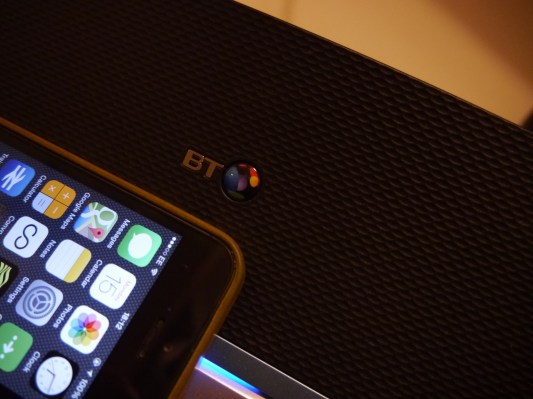UK telco BT has confirmed it is in talks to acquire mobile carrier EE for £12.5 billion — the largest of the U.K.’s carriers, and the first to roll out a 4G/LTE network, back in fall 2012.
BT is best known for its fixed line broadband and legacy landline telephone business. It also sells a subscription on-demand IPTV service, called BT TV. But the company was an early player in the U.K.’s mobile telephony market — spinning off its BT Cellnet brand in 2002, and subsequently selling the business entirely, by then known as O2, to Spain’s Telefonica for £18 billion in 2005.
O2 remains one of the four mobile network operators in the U.K. market, along with EE, Vodafone and Three. All four have now rolled out LTE/4G services, although EE gained a head-start by kicking off its rollout ahead of a big public spectrum auction last year, by refarming its existing spectrum holdings.
Given the massive rise of mobile over the past decade, and the corresponding slide in use of fixed line landline telephones, BT’s decision to exit the cellular space in 2005 looked premature and poorly thought through. So it’s no surprise that in recent times the company has been making fresh moves in mobile, acquiring 4G spectrum at public auction in 2013 and launching a 4G mobile plan for small business customers this summer, piggybacking on EE’s mobile network.
However a proper return to the cellular arena for BT has been rumored for a while. Last month rumors linked BT with both O2 and EE. But the latter carrier has evidently prevailed as the target of BT’s acquisition interest at this point.
The company said today is in exclusive talks with Deutsche Telekom and Orange (the joint venture owners) in relation to acquiring EE — with negotiations slated to last several weeks.
In a statement BT said:
The proposed acquisition would enable BT to accelerate its existing mobility strategy whereby customers will benefit from innovative, seamless services that combine the power of fibre broadband, wi-fi and 4G. BT would own the UK’s most advanced 4G network, giving it greater control in terms of future investment and product innovation.
While continuing these exclusive discussions, BT will progress its own plans for providing enhanced fixed-mobile converged services for businesses and consumers, in line with previous announcements. It remains confident of delivering on these plans should a transaction not take place.
Asked about its confidence in gaining speedy regulatory approval for any acquisition of EE — should a deal be hammered out — a BT spokesman told TechCrunch: “We anticipate notifying the Competition and Markets Authority (CMA) if an agreement is reached. The CMA then has defined timescales for its inquiry – in particular it expects to reach Phase 1 decisions within 40 working days (i.e. 8 weeks) of formal notification. If the CMA opened a Phase 2 inquiry, that usually takes a further 24 weeks to complete.”
“We’re confident that the transaction would bring benefits for customers and not undermine other players’ ability to compete effectively in any individual services or bundles. The UK is the only market in Europe where the incumbent operator doesn’t own a MNO, so this would effectively put BT in a similar structure to other European peers,” he added.
BT said the headline price for EE that’s being discussed is on a “debt/cash free basis”. Should negotiations prevail it added it would be payable as a combination of cash and new BT ordinary shares, with Deutsche Telekom holding a 12 per cent stake in BT and Orange holding a four per cent stake.
Should it succeed in acquiring EE, BT’s statement goes on to anticipate “significant synergies” — via network and IT rationalisation, back-office consolidation and the like. So, in other words, it would be shaving off duplicate jobs to achieve business efficiency savings.
It also says it expects to cross-market its fixed line services to EE customers to generate new revenues. The U.K.’s broadband market is relatively competitive so it’s clear why BT sees big benefits in having a mobile pipe to sell its fixed lines services to. As of the end of September EE had a total of 24.5 million direct mobile subscribers in the U.K., on contract and pre-pay tariffs.
If agreement is reached between BT and EE, BT’s shareholders would still need to approve the transaction.
